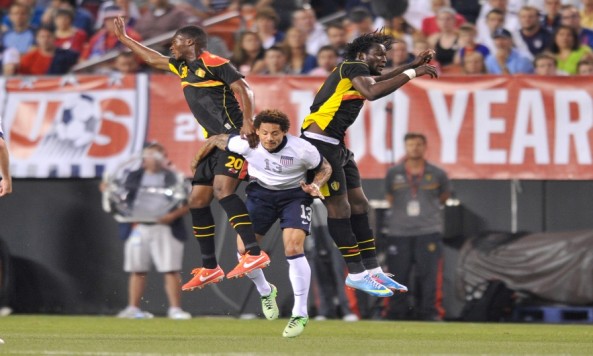Spain has certainly had a storied run in international football over the last decade. Between November 2006 and June 2009, La Roja went undefeated for a record-tying 35 consecutive matches before their loss to the United States, a record shared only with Brazil. The team’s achievements have led many experts and former players to conclude that this Spanish side was among the best ever international sides in world football. While that opinion is subject to debate, what is not up for debate is the fact that Spain won the Euro 2008, the World Cup in 2010 and the Euro 2012, quite an impressive array of silverware.
It is difficult to continue this level of success for any country, and Spain has proven to be no different in this regard. Their current crop of players has aged and has not been replaced with similar quality players, affording other countries the opportunity to figure out Manager Vicente del Bosque’s tactics and use them to their advantage.
Rather than mourning the passing of a great squad or reminiscing over La Roja’s success, let’s look ahead and see which team (or teams) can replace them on the world stage as the next potential dynasty.
Belgium
Their current crop of players has been referred to as the New Golden Generation (they refer to their original Golden Generation as ending in 2002). These players are the offspring of an ambitious revamping of their youth development program, and if the team’s success will be any indication of their player’s club successes, the Red Devils would seem to be headed into a golden decade.
While having one of youngest squads in this years’ World Cup competition, almost every player represents a major club team in Europe, and has played at the highest level of competition at a young age. Their current manager, Marc Wilmots, is himself a former Belgian international footballer who was previously an assistant to the squad, and is well acquainted with the dynamics of the team. Wilmots should also be able to handle the politics behind the team if need be, having been elected to a term in the Belgian Senate in 2003. If Wilmots can put all of the pieces together successfully, it may be Belgium that enjoys the silverware and glory that Spain has enjoyed over the past decade.
The Netherlands
It was only four years ago that Spain beat the Netherlands in the World Cup final 1-0 in extra time, employing a style of play that was referred to as ugly and vulgar by former Dutch stars as Johan Cruyff. Fast forward four years later, and le Oranje soundly beat Spain in the opening round. Two years earlier, they were in the Euro 2012 “group of death” and did not win a match. Written off two years ago, the Dutch are now a force to be reckoned with. While their starting strikers are approaching their “expiration dates”, that is not the case with their other positions, where many of their rising stars are in their mid-twenties. And as far as future strikers go, their call-ups for the squad that preceded the choosing of their final 23-man roster would indicate that they have a young core group of forwards ready to compete on the international stage.
Le Oranje will be losing their manager Louis van Gaal to Manchester United immediately after the Cup concludes, but they will have two years until their next major competition (Euro 2016) and one would bet that the Dutch already have a short list of candidates to replace him. With a storied past and a promising future, there’s no reason not to think that the Dutch will be anything but solid contenders in the next decade.
France
While many on the international stage were focused on the internal collapse of the French national team in the 2010 World Cup, Les Bleus almost immediately began reconfiguring their management staff and players to create more team play and harmony within the ranks. While maintaining ample discipline, they chose a new manager, Didier Deschamps, himself a former French international footballer who tasted glory with the team in the 1998 World Cup and Euro 2000. The few “mutineers” were immediately shown the exit door, and Deschamps set about building a squad that would put team and country first.
When veteran players such as Franck Ribery were ruled out of the competition due to injury, many felt that the French wouldn’t be able to compensate for the loss of a player of his talent and leadership. Watching them play has debunked that theory, and the French have proven themselves a force to be dealt with. A look at their squad shows a lot of talent among their younger players, and Deschamps is looking at the present with an eye towards future competitions. In terms of consistency, the French are one of only three countries who have qualified for every World Cup since its inception in 1930. Look for this team to be among the top contenders on the world stage in the next decade.
Germany
While this is a group that entered Cup play with some major injuries, manager Joachim Low, among the brightest minds in the game today, has rallied his troops to carry on the tradition of German glory on the pitch. It is a credit to his player selection and style of play that continues to make this team a force in this World Cup competition and beyond. While no one really thought that Nationalmannschaft would fail on the pitch due to injury, their concentration on fundamentals and team play are paying dividends.
This is a team that has won the World Cup three times and been runners up four times. The last three events have seen the Germans take third place twice and runners up twice, but the Germans want this to be their time for glory. Low is looking at the current Cup as winnable, but is always looking toward the future. Unlike most other international teams, his players are dominant forces within the Bundesliga, aiding them in consistent team play. Additionally, a look at their roster shows a surprising verve towards youth, with no one player on the roster in any position other than striker over the age of thirty. A model of consistency, Germany can be expected to continue their strong play into the next decade.
…But what about the non-European teams?
Aside from having strong financial support from football federations within their respective countries, one common denominator that is apparent is that all the above-mentioned countries have their own football leagues. While it can be argued that some are more talent-laden and successful than others, it can also be said that having home-grown leagues helps in developing their youth talent and thus better prepares them for the international arena. Other countries have their own leagues as well, including many non-European countries that were omitted above. While some of those countries have talented leagues, they are bereft of the financial support that exists in, say, European football.
Additionally, while countries like Brazil and Argentina are laden with talent, their team play falls short of the squads mentioned above. While there is little argument that players like Neymar and Messi are among the top footballers in the world today, should one of those teams win the World Cup, it would likely have more to do with geography and conditioning than any other factor. There hasn’t been a World Cup held in South America since 1978, and as of this writing, the South American teams have a combined record of 8-3-1, with one of their own (Chile) delivering the knockout blow to Spain. No European team has ever won the World Cup in South America. Ever. And while the playing field is the same for all teams, European teams have a much harder time adjusting to the coarser and patchier fields in Brazil, while the South American players are more accustomed to those field conditions.
On a neutral field, it is talent combined with consistent team play that is the benchmark of a champion, and the four teams mentioned above can be expected to reside at the top of the table for years to come.
























